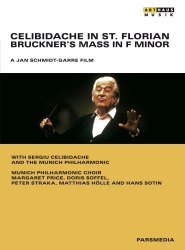|

Support
us financially by purchasing this disc from |
|
|
|
|
Anton BRUCKNER (1824-1896)
Celibidache in St. Florian
Mass No. 3 in F minor - Documentary of rehearsal and performance sequences [60.00]
Margaret Price (soprano), Doris Soffel (mezzo), Peter Straka (tenor), Matthias Hölle (bass), Hans Sotin (bass)
Munich Philharmonic Choir and Orchestra/Sergiu Celibidache
rec. Stiftskirche St. Florian, 1993
Director: Jan Schmidt-Garre
Picture Format: 4:3
Disc Format: DVD 5 NTSC
Sound Format: PCM Stereo
Region: 0
Language: German
Subtitle Languages: English, French, Spanish, Japanese
Bonus: Guest appearance of Sergiu Celibidache and Munich Philharmonic Orchestra in Moscow during a state visit, 1989 [5.00]
ARTHAUS MUSIK DVD 101678
101678 [65.00]
Many could be forgiven for thinking, as I did, that this is a complete
concert performance of Bruckner’s F minor Mass. The front cover
of the DVD does not lead you to suspect otherwise. It is only when
reading the small print on the back that you discover that this is
a documentary of rehearsal and performance sequences by the director
Jan Schmidt-Garre. This is disappointing, and I feel that this should
have been made clear on the front cover. Furthermore, the only date
given is a publishing date of 1993 and, having watched the film three
times, I am totally confused as to the chronology of the events documented.
As the title suggests, the focus of the DVD is on the St. Florian
performance, which I would presume took place in 1993. The rehearsal
sequences in the church would likewise be from that occasion. I noticed
that in the rehearsals in the Philharmonic Concert Hall, the orchestra
has a different leader. Also, the bass here is Matthias Holle, whereas
in St. Florian it is Hans Sotin. This leads me to suspect that the
rehearsal excerpts in the concert hall are from an earlier date, a
fact corroborated by the date of March 1990 on the EMI Classics CD
(56702) of the Mass, which has the same soloists, including Holle.
Yet there are many positive aspects to this documentary. As always
with Celibidache, his is a very personal approach. His tempi are on
the broad side, especially if you compare the speeds with Jochum (DG
447 409), a benchmark recording of this work for me. Yet, in this
work, Celi’s tempi do seem to work, allowing the textures to
emerge. Throughout, the documentary gives us some insight into the
maestro’s profound musicianship and devotion to the score. He
knows the work inside out, directing both the performance and indeed
the rehearsals without a score. He is a great source of inspiration
for the orchestra, choir and soloists alike. Like Carlos Kleiber,
Celi demanded and had the luxury of more rehearsal time than most
other conductors.
What is also evident from the film is his attention to detail. He
is concerned at all times with orchestral/choral balance, and shaping
the musical phrases into a coherent whole. Phrasing and dynamics are
also an important factor. He criticizes Brucknerian scholars like
Loewe, who incorrectly substituted the time signature alla breve
for 4/4 in the Gloria,which was Bruckner’s
intention, ‘it is the Credo in 2’ he emphatically
states. His interaction with the performers is fascinating. He switches
from German to English quite readily. Indeed I have heard it said
that he could speak several languages fluently. His smile is beguiling,
and he frequently praises the performers, always showing them great
courtesy. He is on first name terms with some of the principals. He
loses his temper only once at the beginning of the film when he decides
that he wants the choir to be moved forward to accommodate the acoustic
problems of St. Florian. This necessitates the orchestra being rearranged.
When one poor man questions the logistics of this move, Celi forcefully
insists that his demands are carried out without question.
Throughout, the documentary switches between orchestral rehearsal,
orchestral/choir rehearsal, piano/choir rehearsal and concert performance.
All five performers - including the interchangeable basses - are excellent.
It is poignant to see the soprano Margaret Price, who died two years
ago in 2011.
As a five-minute bonus we get a small filmed extract of the maestro’s
trip to Moscow with the Munich Philharmonic in 1988. The film appears
very dated and grainy, and looks as though it was shot in the 1960s.
It shows part of a press conference that Celi gave, and ends with
an orchestral rehearsal of the Russian and German national anthems.
His remarks to the orchestra at the end are salutary: ‘Keep
the discipline. You are being filmed and watched’.
It is extremely disappointing that a complete performance of the Mass
is not included. After all, the duration of the DVD is only 65 minutes
and presumably the entire St. Florian performance was filmed anyway.
There is no separate booklet, and the only documentation is an interview
between Schmidt-Garre and the conductor, printed on the inside cover
of the DVD case. Nevertheless, it is good to see the great maestro
at work, and budding conductors will learn a great deal from this
film, though I cannot help feeling that many acquiring this DVD will,
in the end, feel short-changed.
Stephen Greenbank
Previous review: Paul
Corfield Godfrey
 |
 |
|



 All Nimbus reviews
All Nimbus reviews








